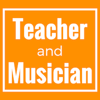Interview: Abigail D’Amore
Over the last few years, I’ve been lucky enough to do some work with Musical Futures. It’s always a pleasure to work with this group of incredibly hard working and innovative professionals so it was important to me that Abigail D’Amore, CEO of the newly-independent Musical Futures, was featured in a Teacher and Musician interview. Here, Abigail talk about the opportunities granted by independence from the Paul Hamlyn Foundation, what we can expect from the Music Learning Revolution and the world-wide consistency of good music learning.
You’ve been a part of Musical Futures for 11 years. If you had to summarise what MF has achieved in that time, what would you say?
I believe one of MF’s biggest achievements has been to create a model of music education that is sustainable and replicable, that cuts across limits of curricula, geography and time. By focusing on a pedagogical framework where the students and teachers drive the development, it has bred an international grassroots movement of teacher and practitioner innovation and sharing, rather than a curriculum that gets locked into an era. Yet, despite the growth and innovation, it remains a tried-and-tested approach, that has strong routes in academic rigour and action-research that was pioneered by teachers themselves. It has impacted on more than 1.5 million young people, which is something we are all proud of.
Now that MF is independent, what can changes can music teachers expect to see?
Musical Futures is now an organisation, not a project, so there are some inevitable changes in the background. We are operating much more professionally and are developing some interesting new partnerships to support our work. Our existing resources and approaches will remain free and open source. We are launching a new and improved professional development programme in September 2015 which not only introduces what Musical Futures is, but really digs down into how to apply it in individual school contexts. We have a new course for composing and improvising, which can be applied particularly at Key Stage 4. For primary schools we are piloting Just Play, which is devised for generalist classroom teachers who want to facilitate relevant, impactful music learning themselves.
A new website will come online during the autumn term, with extra resources and tools for teachers. We’ll be strengthening our international links, and in due course be looking at how we can facilitate teachers sharing and exchanging knowledge about Musical Futures. And we have various development projects in the pipeline which will come online during the course of the next year, both for in- and out-of-school contexts, so watch this space!
The Music Learning Revolution takes place in October. What can music teachers expect from this event?
The Music Learning Revolution aims to create a space where teachers and practitioners involved in delivering music in their schools (whether primary or secondary) can come together, share ideas, learn, be inspired, and take tangible ideas back to their classrooms. We created this event in direct response to requests from music teachers. There was a sense that people wanted to be able to celebrate all that is good about music in schools, while also being challenged to improve their own practice and develop new ideas.
Workshops have been crafted around teacher need – and are mostly delivered by teachers and practitioners. Teachers also felt passionately that we should show some of the brilliant work that happens with students in classrooms – so we have a performance and participation strand for young vocalists who will be working with internationally acclaimed beatboxer Shlomo. Finally we are hosting a debating arena where music teachers, young people, head teachers and representatives from within and beyond the music education sector will debate real issues facing music educators.
Acclaimed film director and education and technology pioneer Lord David Puttnam will open the day with an inspiring keynote about driving innovation, and Shlomo and the students will close with a massed beatbox choir. We have tried to craft a festival of innovation in music education that becomes the go-to event for music teachers wanting to find new ideas, network with others, and, do you know what? Have a laugh and be musical while doing it.
As part of your role, you’ve been able to do some travelling to see music education in different countries. Which ideas most resonated with you during these travels?
That it doesn’t matter where in the world you are, remove the formal constructs of school environments, curricular requirements, government policy, and students learn music in virtually the same way anywhere in the world.
I was the research officer in the initial trial of the informal learning model with Professor Lucy Green, and observed hundreds of groups of students learn informally. What I saw in a classroom in Trafalgar Primary School, two hours outside of Melbourne, ten years later looked virtually the same. It was inspiring to see how effectively good models of learning translates.
If you could give music teachers one bit of advice, then what would it be?
To trust in your instincts about what good music learning constitutes, to hold onto this, and to be willing and prepared to share and reflect on what it is that makes your practice effective, as we are all increasingly accountable for what we do. And to constantly look outwards.
You are just as likely now to learn something from a classroom in Australia as from your colleague in the next town in the UK – the notion of teacher isolation shouldn’t exist anymore due to the power of social media and online networks – this is something to harness, and to use to your advantage.

